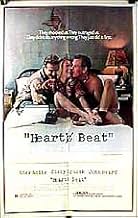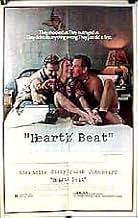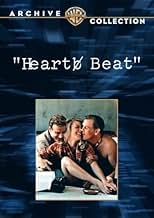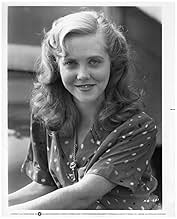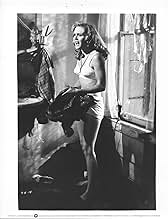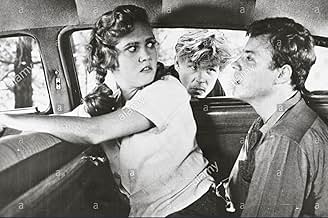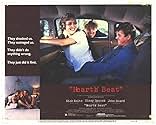Agrega una trama en tu idiomaThe life and friendship among the icons of the Beat Generation: Neal Cassady, Carolyn Cassady, and Jack Kerouac.The life and friendship among the icons of the Beat Generation: Neal Cassady, Carolyn Cassady, and Jack Kerouac.The life and friendship among the icons of the Beat Generation: Neal Cassady, Carolyn Cassady, and Jack Kerouac.
- Dirección
- Guionista
- Elenco
- Dirección
- Guionista
- Todo el elenco y el equipo
- Producción, taquilla y más en IMDbPro
Opiniones destacadas
Potentially fascinating topic, three of my all time favorite actors at their hottest, and complete bore. John Heard, who plays Jack Kerouac, tells a story about how amazing a young Jessica Lange was when she auditioned for this and Bynum dismissed her as 'just a model'. He brings the fine judgment to every project(see or rather, don't see 'Inserts' or 'The Razor's Edge'). I will give the most some credit for giving the Carolyn Cassidy unexpected agency in what easily could be a highbrow bromance. Sissy Spacek is very good and would win her Oscar for 'Coal Miner's Daughter' which came out the same year. See 'Chilly Scenes of Winter' or 'Cutter's Way' to see how wasted Heard is in this.
I am amazed that so many people on this forum rate this movie as the pan-ultimate film regarding the 'Beat generation'. One comment even goes as far to state that "to a Kerouac/Cassady fan and fan of that era ( late 40s early 50s ) this is pure gold".
Why, I wonder. Because as far as a depiction of reality goes (and reading the raving messages on this forum to many the essence of this film is a fair picture of what actually took place), this film is a travesty if ever there was one. In my files I have (the translation of) an article written by Kenneth Turan in 1979 which contains an interview with the then 55 year old Carolyn Cassady. She says that when she first read the script (by John Byrum), she was taken aback by the untruthfulness's of it. Facts were distorted, characters twisted, and reading some of the dialogues, she said to herself: come off it, this is a sham! However, she was paid 70.000 dollars plus 2,5 percent of the nett turnover, which was as good deal as she might have expected, and soon enough she took to the script, false as it may have been. And why? "If this had been my real life, I'd have been satisfied with it". Also, she loves what Sissy Spaceck did with her part: "I am the true heroin of the story, what more could one want?" So much for character.
Interestingly, Alan Ginsberg refused to cooperate with the film and forbade the producer even to use his name or quote from his poetry. So the Alan Ginsberg character in the movie is called Ira Streiker.
I am 60 years old and read On the Road for the first time in 1969. Last month, forty years later, I read it again. It was a weird experience... Kerouac's prose is baffling, he truly was a great writer, but the experiences he describes in On the Road have no meaning whatsoever. Actually, Neal Cassady is a low life (Kerouac more than once refers to him as "a rat"). And no biopic can change that.
Why, I wonder. Because as far as a depiction of reality goes (and reading the raving messages on this forum to many the essence of this film is a fair picture of what actually took place), this film is a travesty if ever there was one. In my files I have (the translation of) an article written by Kenneth Turan in 1979 which contains an interview with the then 55 year old Carolyn Cassady. She says that when she first read the script (by John Byrum), she was taken aback by the untruthfulness's of it. Facts were distorted, characters twisted, and reading some of the dialogues, she said to herself: come off it, this is a sham! However, she was paid 70.000 dollars plus 2,5 percent of the nett turnover, which was as good deal as she might have expected, and soon enough she took to the script, false as it may have been. And why? "If this had been my real life, I'd have been satisfied with it". Also, she loves what Sissy Spaceck did with her part: "I am the true heroin of the story, what more could one want?" So much for character.
Interestingly, Alan Ginsberg refused to cooperate with the film and forbade the producer even to use his name or quote from his poetry. So the Alan Ginsberg character in the movie is called Ira Streiker.
I am 60 years old and read On the Road for the first time in 1969. Last month, forty years later, I read it again. It was a weird experience... Kerouac's prose is baffling, he truly was a great writer, but the experiences he describes in On the Road have no meaning whatsoever. Actually, Neal Cassady is a low life (Kerouac more than once refers to him as "a rat"). And no biopic can change that.
Writer director John Byrun's Hollywood whitewash of the Beat Generation completely ignores its most conspicuous trait, settling for routine conformity over the uninhibited freedom, which gave the movement its energy and impetus. Instead of following their example the film tiptoes respectfully through the rebellious antics of Jack Keruac and Neil Cassidy, in tepid portraits calculated not to offend anyone, least of all Carolyn Cassidy, whose memoirs inspired the film and whose blessing the makers obviously courted. Nick Nolte (as Cassidy) fares best, but only for lack of adequate comparison; John Heard's portrayal of Keruac makes the over-indulgent writer seem a confused but nice young man unable to measure up to his own legend, and Byrun apparently never bothered to give Sissy Spacek a character at all. Each is simply a two-dimensional reduction of a historical archetype, and none is able to save the film from cardiac arrest.
Fictionalized account of the friendship between writers Nick Cassady and Jack Kerouac, members of the so-called Beat Generation of the late 1950s. Writer-director John Byrum takes a sketchy, connect-the-dots approach to these famous people, and his opaque screenplay, adapted from Carolyn Cassady's memoirs, leaves the actors (Nick Nolte as Cassady, John Heard as Kerouac, Sissy Spacek as Carolyn) often looking as if they haven't been clued-in. There are moments when the cast and the well-realized surroundings warrant far more interest than the story or the dialogue, and that's a weak obstacle in a film about writers. The film is also extremely somber, with only bits and pieces of quirky humor (thanks to a supporting turn by Ray Sharkey) to elevate the depressive air of self-conceit. Visually impressive production, solid work from the men, but Spacek's role is underwritten. ** from ****
This is another good movie about a fascinating time, place and group of people in Americana that was missed by most people. It was a film that you didn't want to end. I highly recommend it, especially to the younger generation who don't know what cool really is...
¿Sabías que…?
- TriviaThe role of "Ira" is a thinly veiled portrayal of Allen Ginsberg. The name was changed after Ginsberg objected.
- Citas
Mrs. Kerouac: I don't understand why you're doing this?
Jack Kerouac: I don't either; but, I know I want to do it.
Mrs. Kerouac: But, I thought you always wanted to be a writer?
Jack Kerouac: I do. That's why I want to do it. I want to get him down on paper.
Mrs. Kerouac: Can't he get himself down on paper?
- Bandas sonorasI Love Her, Too
Vocal by Aaron Neville
Music by Jack Nitzsche
Lyrics by Buffy Sainte-Marie and John Byrum
Selecciones populares
Inicia sesión para calificar y agrega a la lista de videos para obtener recomendaciones personalizadas
- How long is Heart Beat?Con tecnología de Alexa
Detalles
Taquilla
- Presupuesto
- USD 3,500,000 (estimado)
- Total en EE. UU. y Canadá
- USD 954,046
- Fin de semana de estreno en EE. UU. y Canadá
- USD 74,303
- 20 ene 1980
- Total a nivel mundial
- USD 954,046
Contribuir a esta página
Sugiere una edición o agrega el contenido que falta

Principales brechas de datos
By what name was Heart Beat (1980) officially released in Canada in English?
Responda
